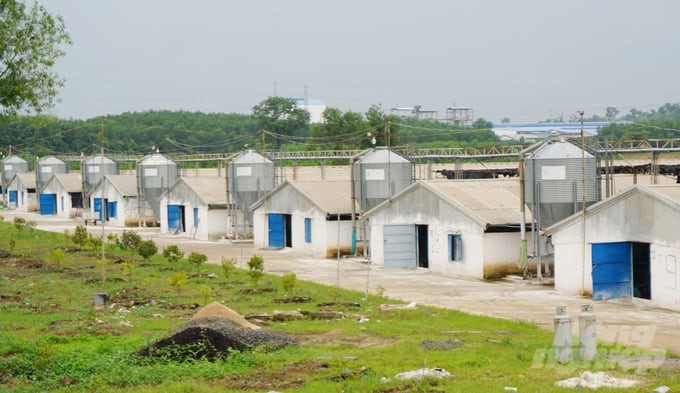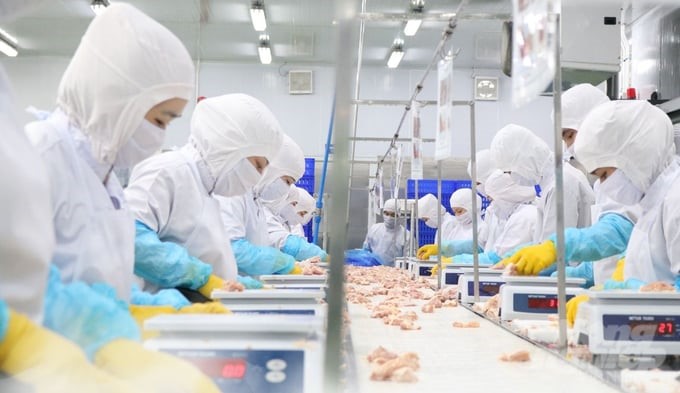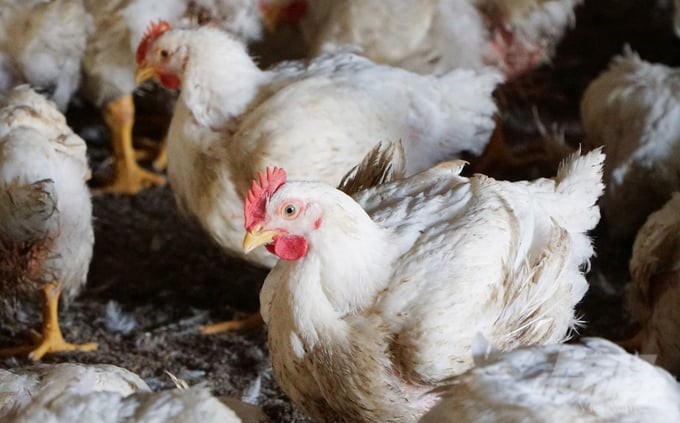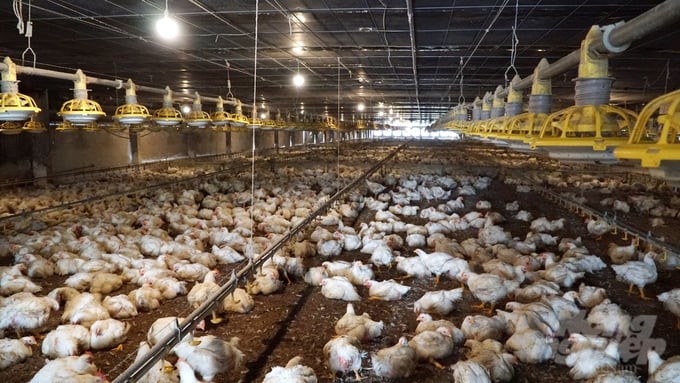June 1, 2025 | 04:42 GMT +7
June 1, 2025 | 04:42 GMT +7
Hotline: 0913.378.918
June 1, 2025 | 04:42 GMT +7
Hotline: 0913.378.918

Although it is the country's livestock capital, Dong Nai's livestock products are still quite modest in the export market. Photo: Le Binh.
By the end of the first quarter of 2024, Dong Nai has still been the country's livestock capital, with 2.29 million pigs and 23.1 million chickens. Other types of livestock include about 109,000 buffaloes and cows, 2.8 million waterfowl, 8 million quails, and 202,000 goats.
Worth mentioning is that most of Dong Nai's livestock products only serve the domestic market. The province's livestock product export orders are still limited. This was acknowledged by Mr. Tran Lam Sinh, Deputy Director of the Provincial Department of Agriculture and Rural Development.
According to Mr. Sinh, there are three basic difficulties that limit Dong Nai's export of livestock products to the world, including high prices, disease safety, and food hygiene and safety.
One of the difficulties that Dong Nai's livestock industry is facing is that chicken farming on a household scale is still large. Although the total herd ratio is less than 10%, with over 18,000 households and livestock households that have not paid attention to biosafety farming and disease management, scattered outbreaks still occur. In 2022, there were 3 outbreaks of bird flu in the Trang Bom, Cam My, and Vinh Cuu districts, affecting the maintenance of disease-free areas.
"The reason is that household farming is still large. Regulations and standards on veterinary hygiene in Dong Nai must ensure veterinary hygiene according to the regulations of the World Organization for Animal Health. Dong Nai is building disease-free facilities and areas and standard slaughtering and processing facilities to better serve the export of livestock products," shared Mr. Tran Lam Sinh.
Dong Nai goes ahead in livestock farming but has not yet reached the finish line. Currently, the province's livestock industry is having to solve a series of difficulties because standards on disease safety and environment are no longer appropriate.
Meanwhile, output product prices are unstable, and the product consumption market is mainly domestic because product quality does not meet export standards. In reality, the rights of disease-free facilities are not much different from those of facilities that are not disease-free, so the construction of disease-free facilities is not encouraged.
Currently, Dong Nai only has 2 units that regularly export livestock products to demanding markets such as Japan, the US, Australia, etc. Therefore, Dong Nai's export of livestock products is feasible with a very large geographical balance.
Koyu & Unitek Co., Ltd. (in Long Binh Industrial Park, Bien Hoa City) has been exporting processed chicken meat to the Japanese market since mid-2017. Koyu & Unitek now processes and exports about 100 tons of chicken meat/month to Japan.
The business is also operating in the fields of slaughtering, pre-processing, and processing of chicken meat. Koyu & Unitek has a factory that meets HACCP, BRC, ISO 9001, and ISO 22000 standards and has been certified Halal for chicken meat products.
This unit's number of slaughtered chickens meeting Halal standards reaches 780,000–910,000 heads/month. The intended export market in the coming time is Brunei, with the frozen fresh chicken meat product.

Koyu & Unitek is one of two units exporting Dong Nai's livestock products to the Japanese market since 2017. Photo: Le Binh.
Koyu & Unitek is also linking with many cooperatives and large-scale livestock households in Dong Nai to ensure the amount of chicken meat exported. Thanks to that, the province's livestock farming is also more methodical, and production value also increases highly.
Long Thanh Phat High-Tech Agriculture Cooperative is one of the chicken-raising chains following export standards for Koyu & Unitek. Currently, this Cooperative supplies a total broiler flock of up to 2 million heads/year. Thanks to the strict farming process according to Japanese standards and support from the Provincial Sub-Department of Animal Husbandry and Veterinary Medicine in disease control, livestock farming is also low-risk.
However, according to Mr. Tran Khanh Huy, Head of Import-Export Department, Koyu & Unitek Company, exporting livestock products is difficult, but maintaining exports is much more difficult. "Even if there is just the smallest mistake in food safety or disease safety, the company will suffer a lot of losses. Maintaining export orders is not a simple matter," he said.
Specifically, Koyu & Unitek had their processed chicken meat order returned by the Japanese side. The cause was determined to be the presence of E. coli (Escherichia coli) bacteria in the shipment. Despite extremely strict control, the emergence of E. coli is very difficult to avoid. "In particular, if the Japanese side returns the order for the third time, the business will be banned from exporting to this market forever and pay a huge contract penalty," Mr. Huy added.
To facilitate the export of livestock products, the Dong Nai Department of Agriculture and Rural Development is continuing to develop livestock farming in the direction of farms associated with the application of scientific and technical advances in production.
Of which, livestock farming with biosafety, disease safety, and closed production chains has many positive changes. With many policies and guidelines from the Provincial People's Committee, the "livestock capital" has gradually removed the "bottlenecks" that inherently hinder exports.
Dong Nai is focusing on building an export poultry farming chain associated with the formation of disease-free livestock areas according to international standards. This chain is linked between De Heus Group and many provinces and cities in the Southeast. Besides, Vinh Cuu and Trang Bom districts were also chosen as "bases" to build disease-free areas to export live pigs to the large market of China.

The white-feathered chicken is expected to help Dong Nai's livestock industry get more export orders to many new markets. Photo: Le Binh.
According to Mr. Nguyen Truong Giang, Director of the Provincial Sub-Department of Animal Husbandry and Veterinary Medicine, Dong Nai is among the country's top provinces for building disease-free areas. Currently, the whole province has 5 districts recognized as disease-free areas, 11 communes certified as disease-free with bird flu and Newcastle, and 657 livestock farms certified as disease-free.
"Dong Nai's livestock industry continues to develop towards large-scale industrial farms, high-tech applications, and ensuring biosafety in a closed chain. These are favorable conditions for the province to replicate disease-free areas and facilities to meet the export market," Mr. Giang shared.
Countries such as Australia, the US, Japan, the EU, etc. all have extremely strict requirements and constraints on livestock products imported from other countries, especially on disease safety. Therefore, the faster the formation, construction, control, and certification of disease-free areas in livestock production, the sooner opportunities will open for farmers and businesses.
China currently needs to import about 25 million pigs/year. Therefore, Vietnam must soon take advantage of the opportunity to compete. Businesses must pioneer in building disease-free areas for export and calculating export roadmaps, not just for domestic consumption.
At the end of December 2023, the Ministry of Agriculture and Rural Development and the General Administration of Customs of China signed a "Memorandum of Understanding on requirements for foot-and-mouth disease-free areas using vaccines." This is expected to be a "leverage" to help Vietnamese meat products appear in this billion-person market.
To export, large-scale closed farming chains must be formed. In particular, disease monitoring and control must be strict.

Thanks to the export orientation, many large-scale, disease-free closed farming chains in Dong Nai were formed. Photo: Le Binh.
In recent times, Dong Nai has implemented projects to trace the origin of animals and animal products. As of now, the province has more than 57,000 pigs wearing collars and labeled with traceability stamps. Particularly, the whole province now has 303 maintained pig farms that have declared their livestock production on Te-Food livestock management software, reaching a rate of more than 17.8%.
However, the above traceable source of animal products is mainly supplied to Ho Chi Minh City. In the coming time, Dong Nai will continue to replicate models of traceability for livestock and crop products. This is also a solution that contributes to building the province's reputation for quality livestock products in the domestic and export markets.
According to the World Organization for Animal Health, one of the prerequisites for exporting meat is to build disease-free livestock farming areas. Farmers who practice disease safety will be able to lower livestock production costs because they can reduce investment in disease prevention and treatment for livestock and destruction when livestock encounter diseases. The problem of chemical and medicine residues that must be monitored, warned about, etc. is also controlled and limited.
Translated by Thu Huyen

(VAN) Seafood by-products are opening a new path, combining green growth and technological innovation to enhance the industry's value.

(VAN) Mr. Nguyen Thanh Cong, Vice Chairman of the Son La Provincial People's Committee, reflects on Son La’s journey from barren hills to fruitful orchards after a decade of hard work.

(VAN) FAO’s Director-General addresses the 5th Baghdad International Water Conference.
/2025/05/26/1716-4-nongnghiep-191706.jpg)
(VAN) Chain linkages, technological innovation, and raw material zoning are three strategic pillars for the coconut industry to strongly develop and elevate its position on the global agricultural map.
![Advanced mariculture – an inevitable trend: [4] Accompanied by scientists](https://t.ex-cdn.com/nongnghiepmoitruong.vn/608w/files/sohk/2025/05/13/1941-pgsts-vo-van-nha-140958_717.jpg)
(VAN) According to Assoc. Prof. Dr. Vo Van Nha, Director of the RIA III, the development of advanced offshore mariculture is no longer an option but an essential path for Vietnam’s fisheries sector.

(VAN) Vietnam is intensifying the development of mollusk farming areas that meet international standards, aiming for sustainable growth and enhancing its export position in the global seafood market.
![Advanced mariculture – an inevitable trend: [3] Policy-driven momentum](https://t.ex-cdn.com/nongnghiepmoitruong.vn/608w/files/doanhtq/2025/05/21/0104-0616-0348-nuoi-bien-170339_789.jpg)
(VAN) To ensure the success of offshore mariculture that uses advanced technologies, it is essential to establish supportive policies that inspire both individuals and enterprises to invest with confidence.